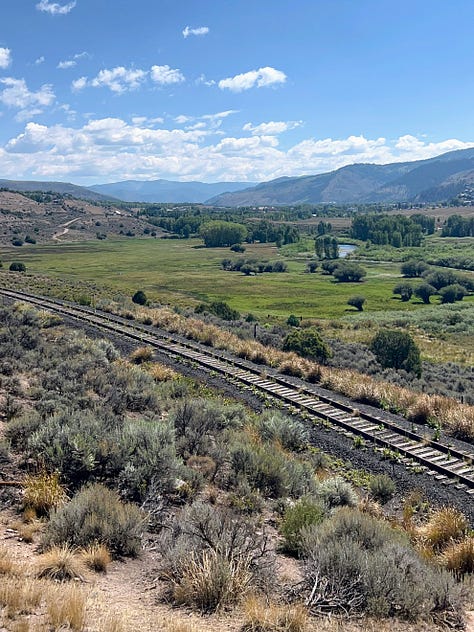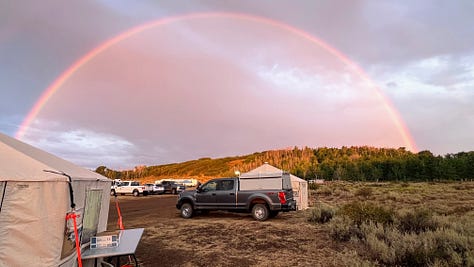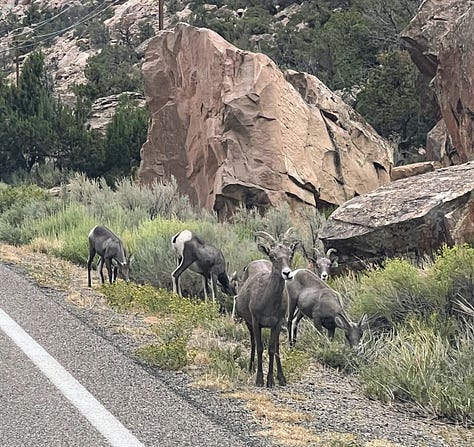Alrighty, it’s been a couple weeks since I’ve gotten home and I’ve had a chance to sit back and think about my experience recently on my very first forest fire. I thought maybe some of you might like to hear firsthand what it’s like to have a quasi-outsider’s thoughts on what it’s like to work on a forest fire, or in my case, two forest fires.
Now, please keep in mind that there are certain things that I can’t share, mostly because of a lack of knowledge on my part. I don’t know anything about firefighting techniques or strategy or how much it costs to run the whole operation. And since I would like to continue on with my career in the Forest Service, let me go ahead and state that none of what I’m going to tell you is the opinion of anyone but myself.
Some background- you might think they’re having a PhD in history doesn’t really lend itself to large scale forest fighting. Well, you’d be right. But I do have a driver’s license and I’m pretty friendly and pretty good at doing what I’m told, so that qualified me to help out as a driver. Basically I would ferry people, food, and equipment from one place to another. And as it turns out, people really like getting fed on time, so I did actually have a purpose.
I was called up to assist in the Turner Gulch fire, which was out in Western Colorado near the Utah border. I got a phone call on a Sunday and was told that I would need to be up there Tuesday by 4 PM. This allowed me to gather all of my equipment and board my dog at the kennel and make my way out there. Basically what you bring is the stuff that you need to go camping- lots of clothes, along with your safety equipment, which includes certain clothes that you have to wear when you’re in the field. Plus whatever snacks that you wanna bring along. You have a tent and sleeping bag and stuff like that that you bring too. So I loaded all my stuff and headed west. What follows are a random set of observations that I’ll share with you.
Fighting fires is a massive undertaking. I was nervous when I showed up because I had no idea what to expect. The fire that I was on was about 32,000 acres when I arrived, which required tons of people to actually fight the fire and support the firefighters. It was actually really impressive to see how smoothly everything operated. And here’s the good news- your firefighters and the teams that support them are incredibly talented and utter professionals. This will be a theme throughout my conversation with you. I was continually blown away just how good everybody was at their jobs.
Fighting fires is a mixed use operation. I work for the Forest Service, but there were people there from the Bureau of Land Management, National Park Service, various state agencies, and private contractors. Here’s the crazy part- everyone got along! It was really cool to get to learn more about the other agencies. I made a lot of friends who work in BLM. One of the things I enjoyed was seeing all of the different T-shirts and badges and logos from different states and agencies everywhere I looked. It was pretty cool.
Safety is the biggest thing. I cannot stress this enough. The number one thing people talked about was being safe. When do you think about firefighters, you imagine the peril that they face. But it’s just as easy to have an accident if you’re driving when you’re tired. So we were constantly reminded to be safe at what we do. If we were tired, go and take a nap. We don’t want anyone getting hurt. That was a really big thing.
We were guests in the community. It was really cool to see all of the signs thanking the firefighters for being out there. And when people saw my Forest Service shirt, they were very kind. At the same time, we were a bunch of people in some small towns. So leadership constantly reminded us to make sure we remembered that we were guests in town. We wanted people to come away with a good impression of the work that we were doing. So be courteous. Make sure that we are obeying all the traffic laws. Make sure that we are neat and we don’t leave any trash around. I’m happy to say that we didn’t need any of these reminders. It was just a really cool dynamic to be in the town and talk to folks.
It gets cold at night at high elevation. Except for rare occasion, you are sleeping in a tent the whole time you’re on a fire. I have an old school Coleman style sleeping bag that’s rated to about 40°. I learned quickly this was not enough. Further, if you’re using a blowup mattress like I do, the air beneath you gets cold and you stay cold because of it. So on my next fire, whenever that is, I’ll need to think about that. At the same time, you get treated to some absolutely amazing views. I was lucky enough to have my tent near a river so I could listen to it run overnight.1 One night I got up in the middle of the night and was able to capture this sight.
They feed you. A lot. You need a lot of calories to fight fires. The men and women on the line really work hard. So there’s a running joke that everybody actually gains weight on a fire. That’s actually true. Some of the support staff include people who prepare meals for everyone. They are working so hard because meal time starts at 6 AM for breakfast. And dinner doesn’t end till 10 PM. I’m happy to say the food was pretty good.





Nothing is better than the 2 PM shower. It turns out that you do actually get to take showers when you’re fighting fires. There’s a giant trailer with shower stalls that people get to use. The shower is open at 6 AM and runs till noon and then again from 2 PM until later in the evening. There’s a kind of deference to the men and women who were actually fighting the fires on the part of support staff like myself. You want the firefighters to be able get up and take a shower and eat food first. They need it and they deserve it. So I don’t wanna be in front of them in front of a line. Instead, I would wait until 2 PM when things were a little quieter and sneak over to the shower trailer. By then it had already been cleaned after lunch and I wasn’t worried about slowing anyone down. And I have to tell you that 2 PM shower felt amazing.
The sense of camaraderie was something else. I wanna come back to this because I want to underscore just how professional these firefighters are. I didn’t pick up on a lick of ego. In fact, the only thing I’ve ever heard about one crew from another was how great the other crew was. People had a real respect for one another. It was kind of inspiring.
Swag is currency. Remember all those different T-shirts and badges I talked about? People collect those. You’ll make friends with people from other states or other agencies and the law and give you a badge or a sticker from their unit. I got to meet some bad ass firefighters from Florida and they hooked me up with a badge. Pretty damn cool.
My counterparts are amazing. We formed a club called The Green Pants Society.
Colorado is a treasure. I think a lot of you know that I have struggled at times being out here. In fact, a common message I’ll get on my social media posts is “Wait, you like it there now?” And maybe I’ve been too hard on the state at times. But I’ve always tried to maintain a level of honesty here that maybe you won’t find someplace else. But I got to spend a lot of time in some gorgeous wilderness in the traditional homelands of the Ute people. It is absolutely magical. And it’s my home now. So here are a few more of my favorite pictures from my trip.






Alrighty. I’ve gotta get back to building the new website and prepping up the podcast for the new episodes that are coming in October (and we have soooo many). Thanks for being here and thanks for supporting my writing and the work that I do. If you want to help out, you can do so at the button below. But regardless, I’m really glad you’re here.
Jason
Also, sleeping next to a river combined with my tiny bladder meant I got up at night. A lot. Better think about that next time.






My son was a volunteer firefighter in college at the West Brow Fire and Rescue, Lookout Mountain, GA. https://usfiredept.com/west-brow-fire-rescue-inc-24728.html Lots of training in Atlanta including SCBA, everything up to starting IVs.
He took a bunch of patches with him when he did a semester overseas in Slovakia. When the professor and other students went back to the states, he went to England for a week to visit automobile factories (a family passion) and dropped in at several fire stations. They always welcomed him warmly, made tea, chatted, and loved his patches which they exchanged for uniform buttons.
Firefighters - universally good people.
Glad there are people like you to pitch in and help!